|
|
|
Sort Order |
|
|
|
Items / Page
|
|
|
|
|
|
|
| Srl | Item |
| 1 |
ID:
100074
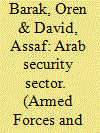

|
|
|
|
|
| Publication |
2010.
|
| Summary/Abstract |
This article discusses the lack of adequate attention to the Arab Security Sector and its complex political and social roles in the Arab States and presents the contours of a new research agenda for this topic. First, the authors demonstrate the insufficient scholarly attention accorded to the Arab Security Sector in several academic publications in the fields of Middle East Studies and Security Studies in the period 1990 -2005. Second, they focus on three major areas where recent theoretical and comparative advances in the study of civil-military relations have not been paralleled in the study of the Arab Security Sector: (1) the role of the Arab Security Sector in the process of state formation; (2) informal connections between actors within the Arab Security Sector and actors operating in the political system; and (3) the role of the Arab Security Sector in reflecting and reinforcing patterns of intersectoral relations in the Arab States.
|
|
|
|
|
|
|
|
|
|
|
|
|
|
|
|
| 2 |
ID:
143794


|
|
|
|
|
| Summary/Abstract |
Increasingly UN peacekeeping missions are helping to implement security sector reforms (SSR), including gender reforms, targeted at the local police of host countries. This study uses the UN Mission in Liberia (UNMIL) and the Liberian National Police (LNP) as a way to explore whether SSR may have helped improve individual officers' professional and gender competencies. Conducting a novel lab-in-the-field experiment, we test the individual competencies of 612 LNP officers, also analysing possible determinants of these competencies. We find that most officers have knowledge about statutory crimes and evidence gathering, most officers participate in group activities, almost half are aware of gendered crimes and that male and female officers are equally competent. However, our results suggest that the reforms are at the nascent stages of working, and that more focus should be put into basic training and gender mainstreaming in the Liberian National Police, especially as new recruits are added.
|
|
|
|
|
|
|
|
|
|
|
|
|
|
|
|
| 3 |
ID:
170277
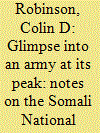

|
|
|
|
|
| Summary/Abstract |
Bagayoko, Hutchful, and Luckham correctly argue that the structures, characteristics, and operating methods of official security institutions in Africa have been somewhat neglected, with a lack of much recent research. The Somali National Army (SNA) sits among these lacunae. Its formal structures can be used as a skeletal starting point and springboard to start to draw the network diagrams that chart informal linkages. This is why recent declassification decisions by U.S. intelligence bodies, coupled with period documents released to the UK National Archives, hold significance in helping us understand early hierarchical SNA arrangements. They show the steady build-up in size of the force, to 1987, to about the time the civil war began to fragment the state.
|
|
|
|
|
|
|
|
|
|
|
|
|
|
|
|
| 4 |
ID:
100962
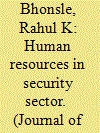

|
|
|
|
|
| Publication |
2010.
|
| Summary/Abstract |
The challenge of management of human resources may be the most profound in the security sector in the years ahead given transformations happening globally and enhancement of human potential and opportunities for individual growth. The national security sector extending from the military to private security guards denotes the plethora of skills sets required which vary from that of handling highly sophisticated and lethal missile arsenal, to commandeering large aircraft carriers and submarines to securing public space in metropolitan cities. Selection, training, motivation and incentivizing the force will be a major challenge for the 21st Century. The need of the hour is, therefore, to have an integrated human resource development policy so that lateral skills can be utilized across the three spectrums of defence, paramilitary and police and private security and enhance talent utilization through motivation. It argues that this will lead to effective and economic utilization of manpower with national ownership rather than as a stove piped resource, corresponding savings to the ex-chequer while adding to proficiency of security forces.
|
|
|
|
|
|
|
|
|
|
|
|
|
|
|
|
| 5 |
ID:
117939
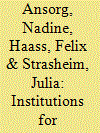

|
|
|
|
|
| Publication |
2013.
|
| Summary/Abstract |
IN DIVIDED SOCIETIES, CHARACTERIZED BY AN ANTAGONISTIC SEGMENTATION
among identity groups, formal state institutions are of paramount importance in regulating intergroup conflict. Institutional reform is thus an
appealing option to shape such state institutions-the system of government, electoral systems and party regulations, territorial state structure, the
judiciary, and the security sector-in order to promote sustainable peace
and prevent the occurrence or recurrence of violent conflict. However,
research is far from having arrived at a consensus about what institutions
work where and how. Is the choice of institutional design in a postwar situation determined at all by expected political utility? What distinguishable
effects can different designs have under what conditions? How do institutions interact-what role does the "concert of institutions" play in the
impact on sustainable peace?
|
|
|
|
|
|
|
|
|
|
|
|
|
|
|
|
| 6 |
ID:
142058
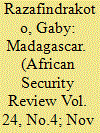

|
|
|
|
|
| Summary/Abstract |
Despite a constitution that condemns discrimination, as well as positive efforts by all stakeholders, Madagascar is still far from meeting the desired objectives of the Southern African Development Community (SADC) Protocol on Gender and Development, or any other relevant international instruments and conventions. The establishment of an Organising Technical Committee on security sector reform for Madagascar is a positive development, which will hopefully facilitate an understanding of the multiple facets of gender and security in Madagascar as well as advancing the implementation of the instruments calling for greater female participation in the security sector.
|
|
|
|
|
|
|
|
|
|
|
|
|
|
|
|
| 7 |
ID:
177564
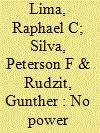

|
|
|
|
|
| Summary/Abstract |
This paper analyses the relationship between national security policymaking and the defence sector. The goal is to understand how a lack of attention to national security policymaking affects the defence sector and vice-versa using Brazil as a case study. Our main argument is that a lack of attention in national security policymaking by civilian elites can weaken political controls over the armed forces, inhibit effective defence reforms that challenge military prerogatives, and, over time, reinforce militarization in national security policymaking, especially in its three main pillars: defence, intelligence, and public safety. We call this process national security neglect. Our case study shows that as internal security challenges grew in complexity, civilian political elites pushed the military to dealing with public safety, border security, and national security policymaking. Civilians also delegated civilian posts to the armed forces in defence, public safety and intelligence, instead of engaging in broader reforms. This led to a vicious cycle of military dependency, deteriorated the already fragile political controls over the armed forces, inhibited defence reforms, and increased the military role in the state and society.
|
|
|
|
|
|
|
|
|
|
|
|
|
|
|
|
| 8 |
ID:
131383
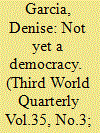

|
|
|
|
|
| Publication |
2014.
|
| Summary/Abstract |
Brazil is considered one of the more successful examples of democratic transition and consolidation in the developing world; and one of the fastest developing and emerging countries. This article contends that Brazil is not yet a fully established democracy, because it lacks the proper civilian checks and balances ensuring full authority over the armed forces, police and secret services. There are five main reasons for this: first, the Constitution does not provide a generalised guide for the institution of civilian oversight. Second, a change of cultural perceptions vis-à-vis the security sector entities is needed. Third, piecemeal rather than holistic or comprehensive legal and institutional transformation has occurred, with little civilian oversight of the armed forces. Fourth, the large structures still held by each of the armed forces require re-articulation and fundamental transformation. Finally, there is no fully fledged civil society participation in security sector life through the media and academia. These problems weaken democracy in Brazil. The course of democratisation in Brazil and the role the security sector played in the transition are examined before discussion of some of the more recent legal and political developments in the security sector, as part of the democratic consolidation. The conclusion presents insights from Brazil's experience and lessons for states facing similar transition challenges.
|
|
|
|
|
|
|
|
|
|
|
|
|
|
|
|
| 9 |
ID:
154379
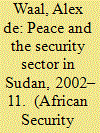

|
|
|
|
|
| Summary/Abstract |
This paper examines how contests over military control were played out during peace negotiations and in the implementation of agreements (including the manipulation or violation of the terms of agreements) in Sudan between 2002 and 2011. The cases examined are the Comprehensive Peace Agreement (CPA) of 2005, the Darfur peace talks which took place from 2003 to 2011, and the post-referendum arrangements talks of 2011. The central arguments presented are as follows: the principal political players consistently sought control over the military as a main component of their political strategies; senior military officers posed a threat to the power of nominally civilian leaders; security arrangements were determined by a combination of the leaders’ calculations over their internal power base along with their expectations of ongoing or anticipated armed conflicts; and external programmes and policies for security sector reform were manipulated and instrumentalised in pursuit of these power goals.
|
|
|
|
|
|
|
|
|
|
|
|
|
|
|
|
| 10 |
ID:
154374
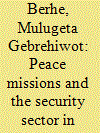

|
|
|
| 11 |
ID:
134355
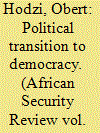

|
|
|
|
|
| Summary/Abstract |
This paper argues that the crisis of electoral democracy in Zimbabwe and Cote d'Ivoire is a result of underlying structural and institutional deficiencies within national and regional multinational institutions. It assesses the extent to which they have been ‘enablers’ or ‘spoilers’ of electoral-based transitions to democracy. Yet it avoids generalisations of the security sector's involvement in political transitions. In terms of structure, the paper is divided into four sections. Section one will briefly discuss the theoretical perspectives of the election-democracy trajectory. It argues that although elections are a major variable for democracy, unless the ‘ecology of elections’ is conducive, elections may not be an instrument of transition to democracy. The second section analyses the militarisation of politics and the role of the security sector in aiding or stalling democratisation. Section three will assess the role of regional organisations such as the Southern African Development Community, Economic Community of West African States and the African Union in electoral-based political transitions in Africa. Lastly, the paper will discuss how the security sector and multinational African institutions can aid political transitions to democracy in troubled African countries.
|
|
|
|
|
|
|
|
|
|
|
|
|
|
|
|
| 12 |
ID:
189352
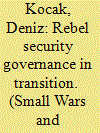

|
|
|
|
|
| Summary/Abstract |
This article investigates the transformation of the FALINTIL guerrilla organisation into the national armed forces in post-independence Timor-Leste. It focuses on how these former rebels interpret and legitimise their role in a changed socio-political environment vis-à-vis other national security actors as well as the population. By tackling the issue of the evolution of guerrilla organisations into formal security actors, the paper speaks to the recent research trend on the legacies of rebel governance, as well as the field of civil-military relations. Based on a qualitative interview case study, it argues that the behaviour of the state security actors, and their respective understanding of their role within the Timorese state, have been determined by internalised socialisation practices of their past. It becomes clear, that particularly the armed forces struggled with their constitutionally limited role on matters of national defence but strove to expand their role into domestic security affairs.
|
|
|
|
|
|
|
|
|
|
|
|
|
|
|
|
| 13 |
ID:
178963
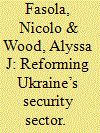

|
|
|
|
|
| Summary/Abstract |
NATO has delivered assistance without taking the pre-existing institutional and ideational conditions of Ukraine’s military landscape into sufficient account.
|
|
|
|
|
|
|
|
|
|
|
|
|
|
|
|
| 14 |
ID:
153530
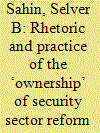

|
|
|
|
|
| Summary/Abstract |
Successful outcomes in security sector reform (SSR) implementation are often conditioned on two key inter-related operational principles: international agencies’ understanding of the ‘local context’ where they intervene and their encouragement of the country ‘ownership’ of the institutional reforms they advocate. Outcomes, however, are determined by power, and different patterns of outcomes are likely to emerge from different types and degrees of power exercised by a multiplicity of actors operating in a dynamic political and social context. Drawing upon these inter-connections between outcomes and power, this article examines Kosovo’s security sector development experience since 1999. It argues that depending on types of, and changes in, power-based interplays between international and domestic forces, different patterns of ‘ownership’ have emerged in the context of SSR implementation in Kosovo.
|
|
|
|
|
|
|
|
|
|
|
|
|
|
|
|
| 15 |
ID:
093015
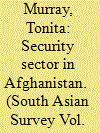

|
|
|
|
|
| Publication |
2009.
|
| Summary/Abstract |
The article presents an overview of the post-Taliban status of the security sector in Afghanistan, particularly the Afghan National Army and police, the courts and judiciary, prisons and security intelligence elements of the security sector. It is argued that uneven distribution of international funding means uneven reform and that if one part of the security sector is neglected in favour of another, all security reform is affected because the institutions are inter-connected. International reform and Western security models are useful but ultimately limited. They can bring about 'hardware' changes but the 'software' changes of culture, values and behaviour can be made only from within. Situating Afghanistan in the historical, cultural and religious context of South Asia and drawing its reform models from this region might be ultimately more effective for the future of Afghan security sector reform than what the present reform phase allows.
|
|
|
|
|
|
|
|
|
|
|
|
|
|
|
|
| 16 |
ID:
093016
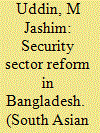

|
|
|
|
|
| Publication |
2009.
|
| Summary/Abstract |
Bangladesh has both external and internal security concerns. As far as internal security is concerned, the list is of some length. It appears that the security sector, especially the police, has not been accountable, transparent and efficient in Bangladesh. Adequate and coherent measures for a holistic reform in the security sector have not been evident in Bangladesh. Moreover, there remains a lack of coordination and accountability even in the reforms undertaken. The effectiveness of any measures taken is further compromised by rampant corruption and bureaucratic lethargy. It is in this context that this article will aim to examine the functionality of the security sector in Bangladesh and the role of oversight mechanisms in making it more accountable to the people. The article will also discuss the key obstacles to reform in the security sector in Bangladesh.
|
|
|
|
|
|
|
|
|
|
|
|
|
|
|
|
| 17 |
ID:
086084
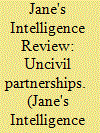

|
|
|
| 18 |
ID:
142054
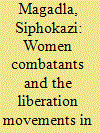

|
|
|
|
|
| Summary/Abstract |
This article examines women's role as combatants in national liberation forces in South Africa. Three categories – guerrilla girls, combative mothers and the in-betweeners – are introduced to underscore the varied ways in which women have participated in combat within the national liberation movements. Factors such as age and one's ability to leave the country affected whether women could participate in combat as ‘guerrilla girls’ or if it limited them to fighting apartheid violence from home, or if there were women who can be defined as having fallen somewhere in between these categories. These categories are used to theorise women's combat roles in the anti-apartheid struggle, thus broadening and challenging the dominant notions of combat that often hide women's contributions in war. In this regard, different periods of struggle, physical location, as well as age, determined the methods of activism available to men and women.
|
|
|
|
|
|
|
|
|
|
|
|
|
|
|
|
|
|
|
|
|